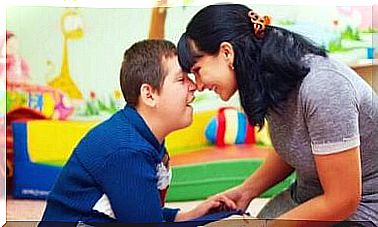8 Tips For Good Family Communication

The key to maintaining a good relationship in any area of life is interaction. Good communication in the family is essential to strengthen bonds, generate more trust and have a pleasant and affectionate environment.
However, in some cases, this communication can be affected by several factors. Therefore, it is important to know strategies that allow you to develop successful communication in this and all areas of life.
Good family communication: trust and understanding
Good family communication is the key to strengthening and maintaining a healthy relationship between parents, children, cousins, grandparents, uncles and other members. Good communication translates into trust and therefore will develop a much stronger family bond.
In this sense, to achieve success, it is necessary to implement or follow some simple tips that will facilitate this process.
Lasting and strong relationships have one thing in common: good communication. It is important to create a space of understanding and tolerance where each family member can openly and honestly develop their personalities and ideas.
Key points for good family communication
1.- Tolerance
Tolerance and understanding are the necessary first step in maintaining fluid communication. It is necessary to create a space of trust where all family members can develop their ideas and thoughts without fear of being judged by others.
One strategy that can be applied in times of discussion or tension is to use a tape recorder. After the discussion, when everyone is calmer, the recording is listened to and analyzed if the answers, tones and reactions were in accordance with the problem that developed.
The interesting thing about this technique is that, if used well, it serves to reflect and avoid making the same mistakes.

2.- Non-verbal communication
Non-verbal communication is just as important as verbal communication. Sometimes the important thing is not what you say, but how you say it. Verbal communication must be accompanied by bodily expressions that ratify what is being expressed.
It is essential to develop communication as clear and transparent as possible. To achieve this, non-verbal communication needs to be as effective as verbal communication.
3.- Avoid criticism
For trust to develop properly, it is important to avoid criticism. Especially those that are destructive.
Advice should always be welcomed, but it is important to do so from an add-on perspective that is not counterproductive to the recipient.
4.- Respect
Good family communication develops around respect. It is important to remember that no one owns reason.
You can even learn from the younger members of the family. Respecting and taking an interest in the ideas of others will strengthen trust and family unity.
Communication: the secret to a good relationship
5.- Honesty
When one of the family members admits to having made a mistake, in addition to reprimanding the fact itself, it is important to congratulate them on their honesty.
It takes courage to admit a mistake, especially on the part of children. Parents should take the appropriate steps in this regard, but it’s good to praise being honest.
6.- actively listening
In these times, cell phones and other electronic devices often make good communication difficult. If you’re in the middle of a conversation or discussion, it’s important to put the phones aside. Active listening means paying attention and looking into the eyes of the person who is speaking.

7.- Transmit important information
A simple but fundamental strategy for improving communication is to convey important information to all family members at the same time.
For important announcements such as moving, traveling, illnesses and others, it is essential to bring the whole family together and share the news with everyone.
8.- Develop interest
Every family member has something valuable to contribute. Once you accept this premise, you can develop an interest in the ideas and thoughts of others.
Although it may seem small, it is essential to listen carefully. It doesn’t even matter that you’ve told it several times, as, if so, it clearly matters to the person involved.
Developing good family communication is possible as long as some basic principles are established. Tolerance, respect and interest are some of the fundamental secrets for successful communication.
They look obvious; however, in the daily routine, they are often forgotten.









